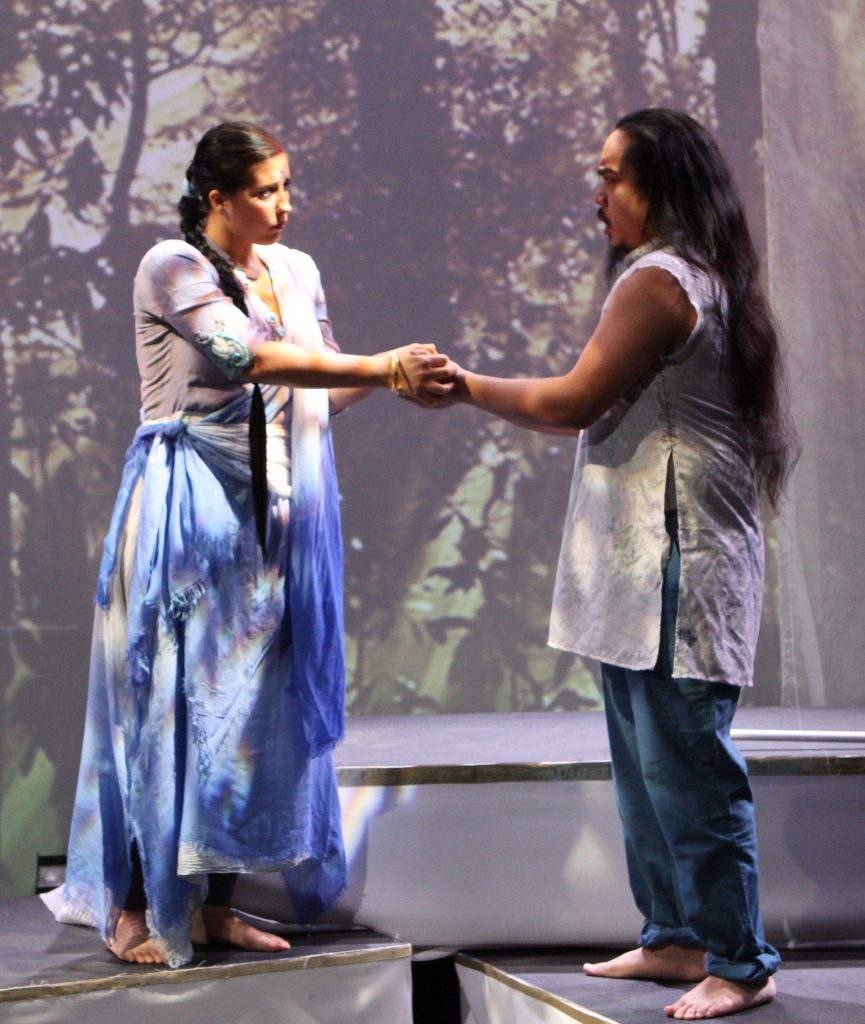New Camerata Opera spans 250 years in double bill of Blow and Holst

Samina Aslam and Daniel Ambe in Gustav Holst’s “Sāvitri” at New Camerata Opera. Photo: Erik Bagger
New York operagoers heard a bizarre double-bill downtown on Thursday night spanning almost 250 years: New Camerata Opera presented John Blow’s 1683 opera Venus & Adonis alongside Gustav Holsts’s Sāvitri, from 1916. A performance of either opera is exceedingly rare, and on paper at least the chance to see them together was intriguing; but in the end the mixed performances demonstrated that novelty for its own sake doesn’t always make for a compelling artistic experience.
Blow’s Venus & Adonis takes the classical myth of the goddess of love and her mortal paramour and makes it stupefyingly insubstantial. The libretto strips away any hint of subtlety or tension from the story: Venus and Adonis are lovers; he dies; she is sad. The music does little to enliven the scenario, either: Blow strings together uncomplicated ideas, barely exploring them beyond superficial repetition. Somehow, this all manages to stretch on for nearly an hour.
Director Jennifer Williams tries desperately to make the opera “cool,” sending Venus’s hard-partying cohort on to chug beers and raise deafening cries of “Woo!” during the overture. Actors in pink costumes under a wash of pink lights stumble around, heckling the audience. Williams does have an inventive solution for the boar that kills Adonis, assembling a giant beast from a living mass of actors carrying various props. Otherwise, she seems to be pleading furiously with her audience to like the piece.
Thursday’s performance did at least feature some admirable singing. Barbara Porto played Venus with a subtle allure, and showed a light yet full soprano, flexible, but with weight and color. Julia Cavallaro was a model of consistency, bringing a firm, warm mezzo, perfect diction, and easy phrasing as Cupid. Most impressive of all was Scott Lindroth, whose rich, wooly baritone and athletic energy made him an ideal Adonis.
Emily Hughes showed a soft-toned mezzo as the shepherdess, while countertenor Biraj Barkakaty struggled as the huntsman, unsteady in his coloratura passages. The chamber orchestra under the direction of Stephan Fillare sounded anemic, steady enough in terms of ensemble but mostly flat in its dynamics—though Fillare brought some flair to his buoyant playing of the continuo part.
In short, Venus & Adonis was outshone in just about every way by Holst’s Sāvitri—even though the latter is barely a half an hour long. Holst’s own libretto presents a story from the Mahābhārata of a woman who tricks Death into restoring her husband to life. The score is tightly written, using minimal forces to great effect, as close harmonies in the orchestra amplify the tartness of the vocal lines, with further support from a chilly chorus of four women. Fillare, joining the violin section, found much more success here, leading a tight performance and finding the balance between moments of musical clarity and the richly constructed murk that forms the basis of the piece’s sonic world.
Samina Aslam gave a convincing performance as Sāvitri, singing with passion and purpose in her spacious paean to Life. Her soprano shows flowing warmth in the middle, focused power at the top, and a rich blaze in her chest. Angky Budiardjono made for a perfect vocal foil as Death, his baritone booming and powerful. Much of Holst’s writing for Death is bracingly direct (“I am Death! I am Death!,” intoned on a single note, becomes a rhythmic motif), and Budiardjono declaimed it with terrifying conviction. As Sāvitri’s husband Satyavān, Daniel Ambe showed a baritone eerily similar to Budiardjono’s, only a shade brighter.
Where Williams overworked her concept of Venus & Adonis, her staging of Sāvitri is all simplicity. Asa Benally’s costumes make symbolic statements about their characters, with Sāvitri in a modest blue sari, Satyavān in rustic attire, and Death in white, with a train of tulle behind him. The chorus lingers behind the actors, a group of shades in black veils. Williams lets the piece speak for itself here, and the result is far more convincing.
Venus & Adonis and Sāvitri will be repeated 7:30 p.m. Saturday and 2 p.m. Sunday at the Flea Theater. newcamerataopera.org


